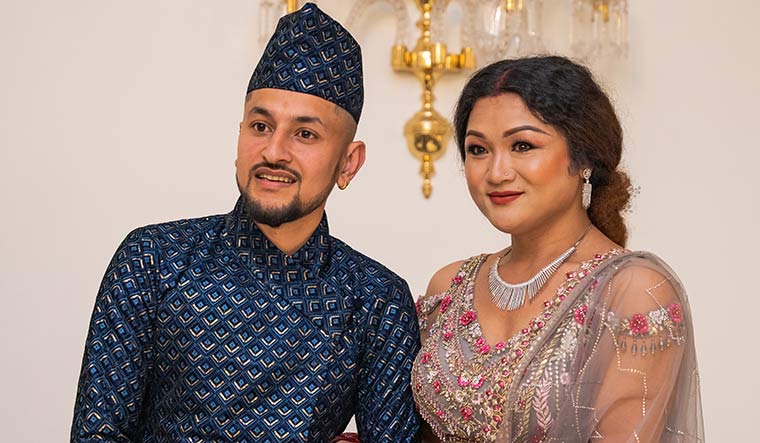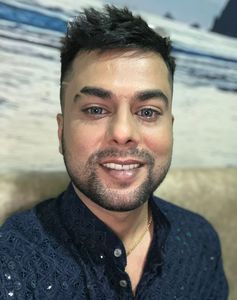“We want to invite the rainbow community in Nepal to come out in the open and join our steps to get married as same-sex couples. We also want the global rainbow community to visit Nepal,” said Maya Gurung and Surendra Pandey, the couple that made history on November 27 by registering the first same-sex marriage in Nepal. Taiwan is the only other country in Asia that has legalised same-sex marriage. Returning from their honeymoon, the couple said they were promoting same-sex marriage not only for Nepalis, but for the rainbow community all over the world with the help of an NGO called Mayako Pahichan (identity of love).
Born Ram Bahadur Gurung to Harimaya and Kul Bahadur Gurung in 1985 in the picturesque district of Lamjung in western Nepal, Maya returned 38 years later as a trans woman to register her marriage with 27-year-old Surendra. Several glass ceilings were broken in this marriage, including gender, caste and age and the local community accepted it and celebrated it with a lot of fanfare.
In the Gurung community there is a traditional folk dance called Maruni in which men dress as women. “I always used to be selected as a Maruni dancer and was taken to perform in Kathmandu, and while dancing I felt like I was a woman. But I realised that I was indeed a woman only after I ran away during one of the performances,” said Maya. She now identifies as a trans woman, but has not changed her gender on official documents. Before becoming Maya, she worked in several restaurants in Kathmandu, making tea and washing dishes. Finally, at the age of 13, she started meeting people who had similar feelings as her and this was when she confirmed her identity as a trans woman.
Maya met Surendra, eight years younger, in Kawasoti, Nawalparasi district, in 2015. Surendra was born a male and identifies as gay. After losing his parents at the age of six, he grew up in an orphanage and had to stop his education after grade 10. “I grew up without love and care, and when I met Maya, we shared a lot of difficulties life had thrown our way. I fell for her,” said Surendra, who works as a plumber. He said he had known about the transgender community, watching them perform during the Biswokarma puja, but came to realise about his identity only after meeting Maya. They rented a room in Kawasoti and stayed there for eight months before moving to Kathmandu. As Maya was known for her activism for the sexual minority in Kathmandu, they had support from the community there.
Two years after their meeting, Maya and Surendra got married in a religious function at a temple with the help of friends. The wedding took place on October 13, 2017, which coincided with Maya and Surendra’s birthday. They tried to register their marriage at the district court in Kathmandu, but got rejected despite the Nepal supreme court’s order that directed the government to register such unions. They continued to seek legal sanctity to their marriage and, finally, on November 27, their marriage was legally registered at the Dordi rural municipality office at Lamjung.
“Although marriage is still defined as a union of male and female in the civil court, Article 18 of the constitution of Nepal guarantees equal rights to the sexual minority in the country and Article 18(3) mentions that the state can make special provisions for them based on which the supreme court gave a verdict in 2007 to recognise same sex marriage,” said senior advocate Dinesh Tripathi. He said the registration of the same sex marriage was legally binding and, although laws regarding such marriages were not yet formulated, Article 16 of the constitution guaranteed all citizens a life of dignity. There could be issues related to adoption, divorce and property rights, for which laws have to be amended. Tripathi said right to equality was among the cardinal principles of human rights, and as Nepal was a signatory to several human rights treaties, it was now the government’s responsibility to ensure the rights of same-sex couples who had registered their marriages. The constitution recognises the status of the third gender and allows Nepali citizens to identify themselves as male, female or other. Nepal is one of the few countries to have this option at the airport while filling in visa and immigration forms.
Supreme court lawyer Vishnu Basyal said that while Nepal had made progress towards equality, the country had a long way to go in accepting same-sex unions. “As the same-sex marriage that was registered recently still could not come out of the binary notion and terms, the married couple was represented as bride and groom/husband and wife,” she said. Civil society activism and proactive decisions of the supreme court have played a crucial role in introducing gender sensitive policies in Nepal, said Basyal, who also teaches at the Nepal Law Campus.
Nepal became a secular state in 2008, which was an outcome of the people’s movement and the Maoist uprising. Before that, it was the only Hindu country in the world. Therefore, Hindu culture, tradition and values are deeply embedded in the people’s mindset.
Beena Poudyal, former head of the central department of Nepalese history, culture and archaeology at Tribhuvan University, said that overall, the registration of same-sex marriage in Nepal was positive and should be welcomed, but warned that its acceptance in a society which was predominantly Hindu would be difficult. “Inter-caste marriage is not new in Nepal; however, it is still not done openly and there are many families that hide the caste of their children’s spouses. Therefore, acceptance of same-sex marriage will not happen overnight,” said Poudyal.
For people to come to terms with the fact that same-sex marriage has been legalised will take a long time. “Science has progressed and children can be born through different ways now, but in a society where religious, traditional and cultural values have strong roots, there will be several challenges that need to be addressed for same-sex couples to be accepted.”
Ananta Maharjan, one of the few certified male beauticians in Nepal, was sympathetic towards the rights of all, but said that he was not aware that people from the same sex could actually get married to each other. He said he had many questions regarding the children of such couples as that was the essence of marriage, in his view.
Bishwaraj Adhikary, Nepal’s first ‘Mr Gay Handsome’, who runs a gay restaurant called Inclusion Galaxy in Kathmandu, said that with the registration of the first same-sex marriage, organisations working for the cause of the sexual minorities should come together to make sure that their rights were ensured. He expressed confidence that such couples would be accepted by society, although many gay and lesbian couples were still not comfortable coming out.
“I am positive that our struggle will succeed. The registration of same-sex marriages is our big achievement and we will continue to lobby to get laws formulated to support same-sex marriages like [laws on] adoption, divorce and property rights,” said Sunil Babu Pant, founder of the Blue Diamond Society. Pant, who is also a former MP, said he was confident that the Nepali society would accept same-sex couples, despite its Hindu heritage. “Fundamentalism in India and Nepal is totally different,” he said. “In Nepal, people are very tolerant and are welcome to change. Therefore, we are now promoting tantric tourism walk and promotion of Nepal as a destination for LGBTQ communities as a touristic destination for same-sex marriage.”



